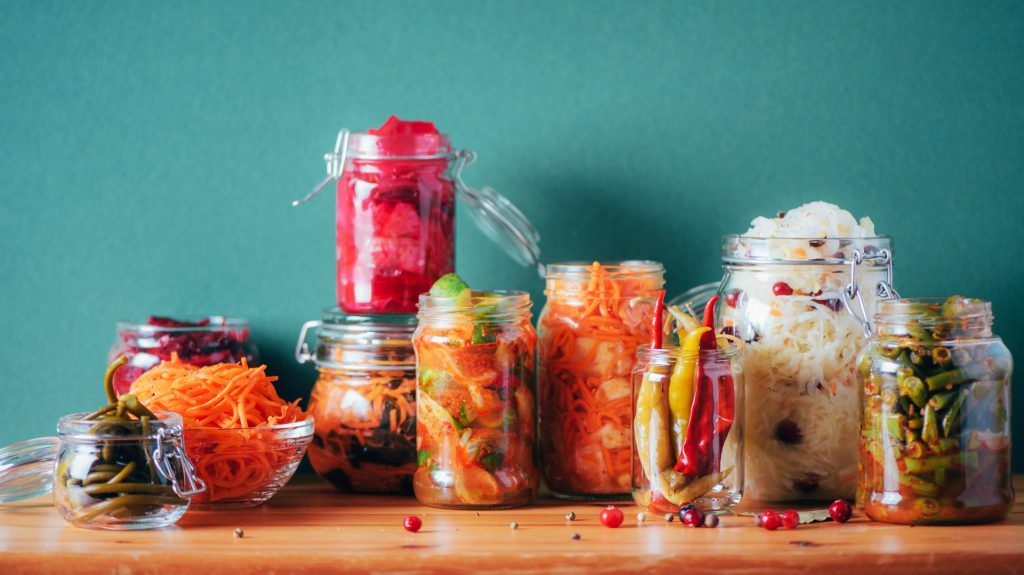Hello everyone, and happy new year! After taking some time off to move my offices, I am officially back. I want to extend a special thanks to those of you who reached out to check on me. I’m doing great! I just needed to pause for the move and renovation. Thank you for your patience while I got settled.
I’m thrilled to support you with more great content this year. I’d love to hear from you if you have a specific topic you’d like me to focus on. You can email us at info@eatfor.life with your thoughts.
In my clinic, I treat several conditions, including but not limited to autoimmune diseases, OCD, ADHD, autism, and depression. However, the one that stands out as the biggest struggle for many people is anxiety. Therefore, for the next several episodes, I am going to delve deep into the underlying causes and drug-free treatment options to help you overcome this often debilitating condition.
In today’s episode, I discuss what happens to your body under stress, your gut microbiome’s role in this process, and why your dietary choices are so important.
I believe sharing is caring, so I have a favor to ask. If my show is helpful to you, please share this podcast and consider leaving a review in Apple Podcasts. It is through sharing that we create community, eliminate guilt and shame, and bring about healing. Thank you in advance for taking three minutes out of your day to support my show so others can find me.
In this episode, I discuss:
- The bi-directional connection between the gut and brain and how an underdeveloped connection can cause anxiety
- The role stress hormones play in promoting the growth of pathogenic gut bacteria
- The benefits of GABA supplementation during stressful conditions
- The need to address the root lifestyle causes of dysbiosis in the gut microbiome rather than just treating the symptoms
- The importance of diet in managing anxiety
- How excessive exercise can increase anxiety
Listen to the podcast here:
Links:
- My Personal Healing Story
- Host Cell Oxidative Stress Induces Dormant Staphylococcus Aureus Persisters
- Worldwide H. pylori antibiotic resistance: a systematic review
- Microbial endocrinology: the interplay between the microbiota and the endocrine system
- My gut feeling says rest: Increased intestinal permeability contributes to chronic diseases in high-intensity exercisers
___
Understanding the Gut-Brain Connection
In previous episodes, I’ve discussed the bi-directional connection between the gut and the brain. When this connection is underdeveloped, I often see a lot of anxiety. This is because the gut produces metabolic and neurotransmitter byproducts that significantly impact the brain.
Research indicates that stress affects the gastrointestinal tract in both direct and indirect ways. It has been found that chronic stress disrupts the gut microbiota and alters the composition of the gut microbiome. It also weakens the colonic mucus layer, which protects you against food antigens and pathogens in your environment.
The Effects of Stress on Digestion
Chronic and acute stressors can alter the composition of gut bacteria. This is because hormones released during a stress response, such as epinephrine, norepinephrine, and dopamine, can promote the growth of certain pathogenic organisms such as E. coli, Salmonella, and H. pylori, as well as opportunistic bacteria such as Pseudomonas, Klebsiella, and yeasts such as Candida. Furthermore, these stress hormones can also increase the formation of biofilms and the virulence of microbes, leading to heightened anxiety and panic attacks.
Chronic stress also reduces secretory IgA, making the gut more vulnerable to pathogens and dysbiosis. Immunoglobulin A (IgA) is the primary immunoglobulin found in the intestinal mucosa. It acts as a “first line of defense” against antigens and pathogens in the gastrointestinal and respiratory tracts. A low level indicates a weakened immune system in the gut.
Aside from pathogen protection, secretory IgA also contributes significantly to maintaining microbial balance and guarding against exposure to antigens from food.
Stress can increase intestinal permeability, also known as leaky gut. Additionally, early life adversity has been associated with changes in the diversity of gut microbial communities.
The Importance of Nutrition in Managing Anxiety
When the body is under significant stress, it goes into fight-or-flight mode, which leads to the shutdown of digestion. As a result, gastric acid production decreases, creating a less acidic environment in the small intestine. This, in turn, prevents the release of pancreatic enzymes and bile by the cells in the intestinal wall. Consequently, there is a decrease in the levels of hydrochloric acid (HCL), pancreatic enzymes, and bile.
When there is insufficient bile to neutralize HCL, the small intestine becomes overly acidic. This acidity deactivates pancreatic enzymes that rely on a specific pH range, leading to various problems. To restore balance in the small intestine, the body reduces HCL production when it detects an inadequate supply of bile. As a result, stomach acid may not effectively eliminate harmful organisms from food and water, increasing the risk of gut infections.
When I look back on my life, the times I struggled the most were times of tremendous stress and hardship. My digestion was off, my skin was constantly breaking out, and I wasn’t sleeping well at all. I would wake up in a panic and try to go to sleep in a panic. This was further exacerbated by my food choices, which is why all new clients to my practice always start their healing journey with a mindset shift in diet.
Even if you already adhere to a Whole Foods diet and reside in a non-toxic home, the occurrence of a stressful event, contracting an infection, undergoing a course of antibiotics, consuming an increased amount of processed foods, or moving into a mold-infested house can unexpectedly exacerbate problems caused by pathogens and dysbiosis that were previously not causing significant issues for you.
The moral of the story is that if you don’t improve the cause of your stress, diet, or digestion; eliminate pathogens, and decrease your toxic burden, it will be difficult to fully restore balance to your gut microbiome. Addressing these factors is necessary to correct the overgrowth. Simply killing bacteria, yeast, or parasites with medications or herbs is not a solution. While I often use botanicals to bring the microbial terrain back into balance, relying solely on them won’t lead to long-lasting healing. Temporary reduction in levels may occur, and you may feel better, but they will likely grow back if the underlying issues are not addressed.
The Impact of Antibiotics on the Gut Microbiota
An important factor in the gut-brain connection that I consistently see in my clinic that contributes to increased anxiety is the use of antibiotics, which kill both harmful and beneficial bacteria in the gut. This can lead to significant damage to the gut microbiota. While some gut bacteria can recover within weeks after a course of antibiotics, others may take months or even years to regenerate, and some may never fully recover.
Using multiple antibiotics simultaneously can be especially detrimental to gut microbes that affect the brain. A 2010 study discovered that H. pylori triple therapy had an impact on certain members of the gut microbiota for up to 4 years after treatment. Yeast infections can arise from the use of antibiotics, reinforcing the need for cautious and appropriate usage. Antibiotic resistance is also a significant concern, which is why I prioritize diet, lifestyle, and addressing nutrient deficiencies in my practice to promote healing.
The Role of Gut Bacteria in Mental Health
Many species of bacteria in the gut produce neurotransmitters like serotonin and GABA. When these bacteria are present at normal levels, the gut has an appropriate amount of these neurotransmitters. However, imbalances in these species can lead to symptoms such as diarrhea, constipation, and high anxiety. Certain bacteria can produce GABA, which is the primary inhibitory neurotransmitter with a calming effect. Low levels of GABA-producing bacteria, such as Bifidobacterium and Lactobacillus spp, in the gut may contribute to decreased GABA levels. This decrease can potentially lead to symptoms such as anxiety, fear, worry, depression, insomnia, and chronic pain.
Under stress, GABA-producing bacteria are often depleted. GABA is an amino acid known for its calming effects. As mentioned earlier, chronic stress is a major contributor to low SIgA levels. Nutrient therapy has shown significant benefits when stress cannot be immediately alleviated. For instance, a study demonstrated that GABA supplementation increased SIgA levels during stressful conditions.
As I close, I’d like to leave you with a few things to consider if you struggle with anxiety:
-
- If you are in a toxic relationship, have a stressful career, or are dealing with some other significant daily stress burden, consider making some lifestyle changes to improve your health. My experience is that this isn’t going to happen overnight but writing out a game plan is tremendously helpful.
-
- Eat an anti-inflammatory diet: Consuming pro-inflammatory foods like gluten, processed foods, and refined sugar creates a stress response in the body, which can reduce SIgA. Ditch anything in a box, leave out the alcohol, and incorporate more whole foods. Eat protein with each meal to balance blood sugar and eat regular meals. I appreciate that intermittent fasting is popular, but when you are in fight/flight mode, eating regularly helps support circadian rhythm biology. Remember that poor dietary choices always lead to poor mental and physical health.
-
- Don’t over-exercise. For years, I overdid it in the gym. Then I learned that excessive or prolonged exercise can actually lower SIgA, which can lead to leaky gut; however, moderate exercise helps increase SIgA. I have found walking in nature and weight training to be very supportive.
- Reach out for help. I admit asking for help has always been difficult for me, but we need people in our lives that will support us without judgement. If you have constant anxiety and digestive issues, consider working with a practitioner who specializes in these areas. Proper testing can pinpoint the causes of your suffering. A comprehensive nutrient therapy program can bring your body into balance so you have the energy and mindset to move away from the stressor or challenging situation.
In my own season of healing, which you can read about here, God led me to nutrient therapy that ended up saving my life. Often, when we are hurting, we feel God isn’t listening to our prayers, but He does, and suffering strengthens us and brings us closer to Him, which is a good thing, so please don’t give up on praying and crying out to God for help.
Thank you for being with me today. Be sure to come back for another episode on anxiety in two weeks.
I believe sharing is caring, so I have a favor to ask. If my show is helpful to you, I would be so grateful if you would leave me a rating and review on Apple Podcasts. It is through sharing that we create community, eliminate guilt and shame, and bring about healing. Thank you in advance for taking three minutes out of your day to support my show.








